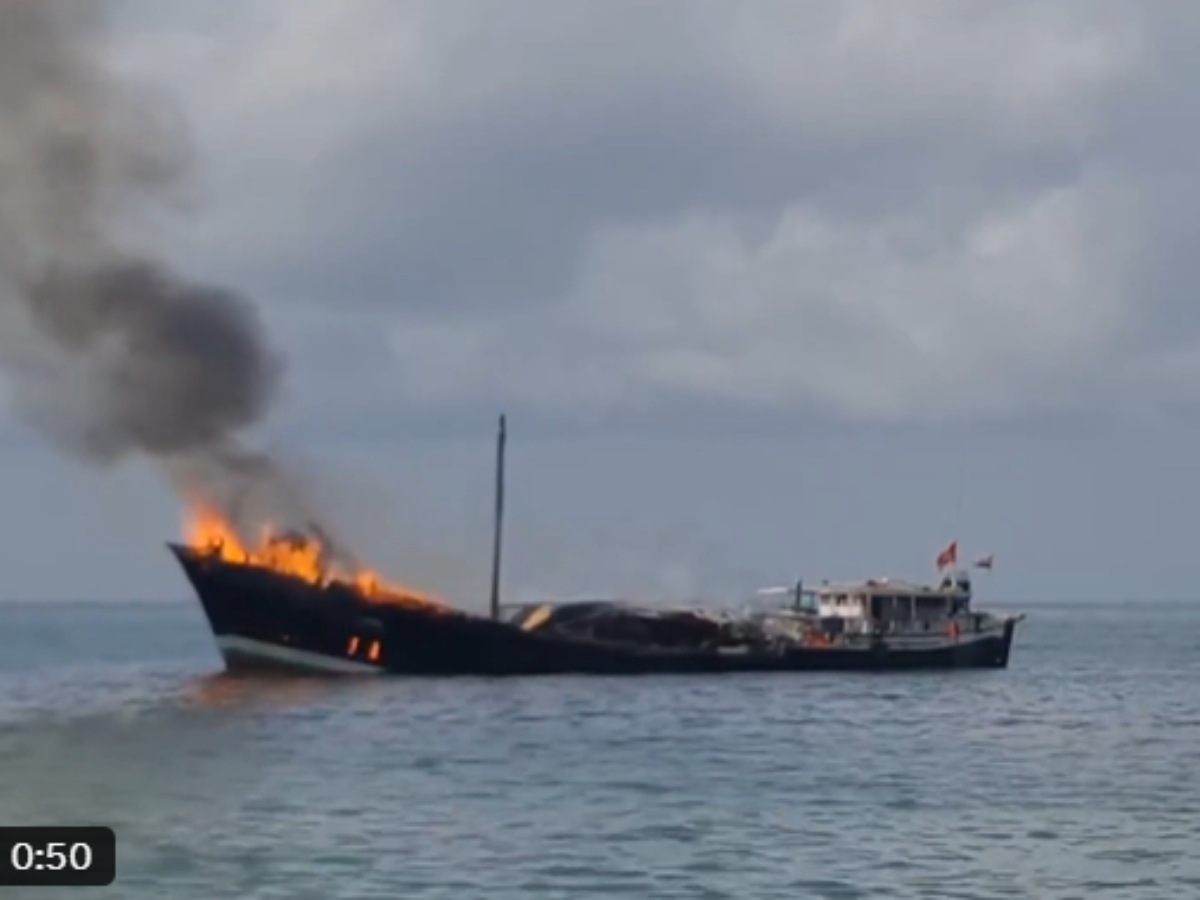Facebook Twitter (X) Instagram Somali Magazine - People's Magazine
A cargo vessel carrying vital food supplies for Somali traders in Puntland went up in flames early Monday while anchored off the coast of Porbandar in India’s Gujarat state. Indian officials and port authorities confirmed that the incident involved the ship Haridharshan, which had left Jamnagar and was heading to Bosaso, the bustling commercial hub in Somalia’s Bari region.
The vessel was carrying around 950 tons of rice and 78 tons of sugar owned by Somali businessmen, who rely heavily on shipments like this to keep food supplies flowing into Puntland. These staples are essential in Somali markets, where imported rice and sugar make up a large share of household diets.
The fire started in the cargo hold of the vessel and quickly spread, forcing all 14 crew members on board to be evacuated. Thankfully, no lives were lost. Fire crews in Porbandar received an emergency alert at 6:40 a.m. local time and were at the scene within ten minutes. They immediately deployed three fire engines to try to contain the blaze, while the Indian Coast Guard provided additional support to prevent the fire from spreading further.
Officials explained that the fire posed a significant risk not only to the ship’s cargo but also to nearby vessels and infrastructure at the port. To avoid greater damage, the burning vessel was towed roughly one kilometre into open waters. This measure helped keep the flames away from the jetty and other ships docked at the port, reducing the risk of a major disaster.
Despite the swift response, the fire caused extensive damage to the rice cargo on board. The heat and smoke also threatened the diesel tanks, raising fears of a possible explosion. Fortunately, these tanks did not ignite, which could have turned the incident into a far more dangerous situation.
The ship was being operated by HRM & Sons, a company based in Jamnagar. Port officials said that while the exact cause of the fire is still under investigation, early reports suggest it may have been triggered by an electrical short circuit in the cargo hold. Investigators are now working to determine what went wrong and to assess the full extent of the damage.
For Somali traders who had invested heavily in this shipment, the incident is a major setback. Imports like rice and sugar form the backbone of Bosaso’s busy port trade. Every year, thousands of tons of these goods are shipped from Asia to Somalia to supply markets across Puntland and even the wider Horn of Africa. Any disruption to these supply chains risks pushing up food prices in Somali markets, affecting ordinary families who depend on these imports for daily meals.
The fire highlights just how vulnerable maritime trade can be, especially when food security for a large population is tied so closely to imported goods. Somali businesses already face challenges such as fluctuating global prices, piracy risks in the Indian Ocean, and logistical hurdles at ports. A fire of this magnitude not only brings financial losses to traders but also adds pressure to already fragile supply systems.
In Bosaso, traders are now anxiously waiting for updates on the final damage report. Many are expected to incur heavy losses, and insurance claims could take time to process. For now, authorities are working to secure the remaining cargo and assess whether any part of the shipment can be salvaged.
While the crew’s safe evacuation is a relief, the broader impact of the fire will likely be felt in Somali markets in the coming weeks. Reduced supplies of rice and sugar could drive up prices temporarily, particularly in Puntland, which relies heavily on Bosaso port as a gateway for imported goods.
The incident serves as a reminder of the importance of safety measures in shipping and the fragile link between maritime transport and food security in regions that depend on imports. Officials in both India and Somalia are expected to continue monitoring the situation closely as investigations into the fire continue.

